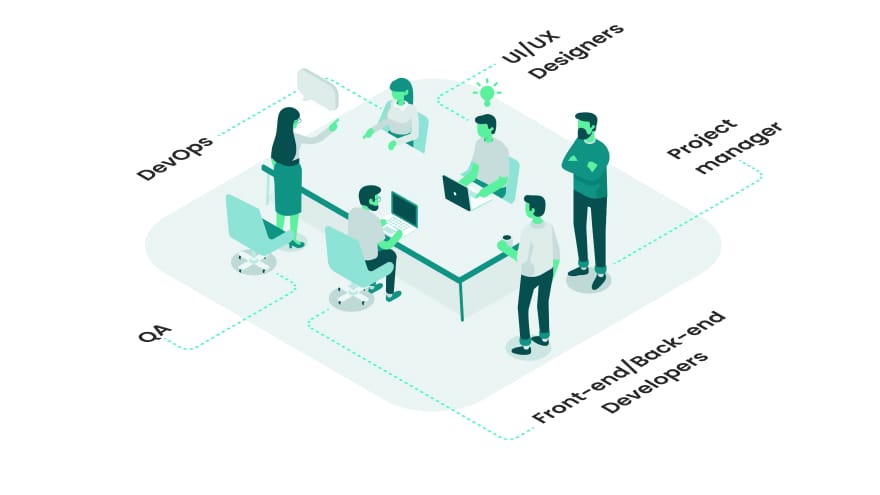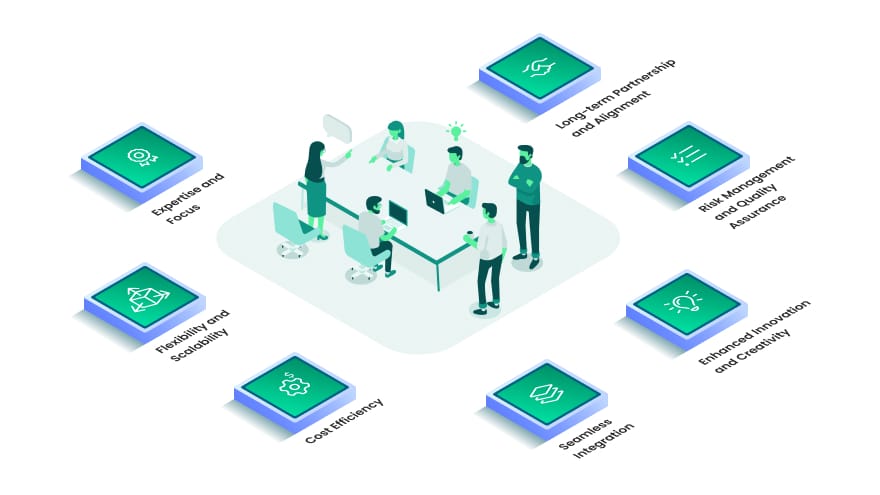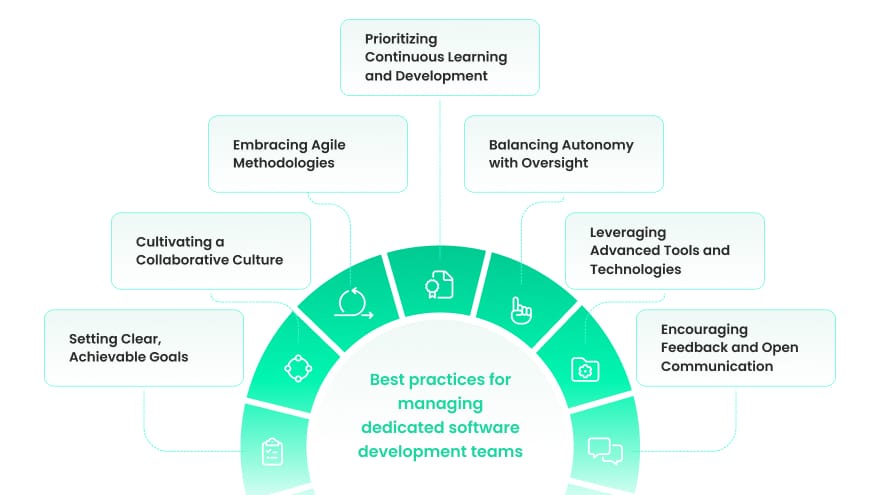What are Dedicated Teams?

Discover how dedicated teams transform software development, enhancing innovation, efficiency, and project success.
Introduction
In the realm of software development, efficiency, expertise, and adaptability are paramount. This is where the concept of dedicated teams comes into play, offering a tailored solution that aligns with these core requirements. But what exactly are dedicated teams, and how do they transform the software development process? Let's delve into this foundational concept before exploring the strategic advantages and best practices associated with dedicated software development teams.
What are Dedicated Teams?

At its core, a dedicated team is a group of software development professionals who are exclusively allocated to work on a single client's projects. Unlike generic outsourcing models where resources may be shared across multiple projects or clients, a dedicated team's focus, expertise, and resources are entirely committed to one client's objectives. This model fosters a deep, synergistic partnership between the client and the team, enabling a seamless extension of the client’s in-house capabilities with the dedicated team acting as a robust, external arm of their software development efforts.
The dedicated team model is characterized by its flexibility, scalability, and the high level of control it offers to clients. Businesses can scale their dedicated teams up or down based on project demands, ensuring that they have the right amount of resources at any given time. This model is particularly beneficial for long-term projects with evolving scopes, where the continuous involvement of a dedicated team can drive efficiencies, innovation, and quality in software development processes.
The essence of dedicated teams
A dedicated team model stands as a pillar for companies aiming to augment their software development prowess. This approach is not just about outsourcing tasks; it's about creating a partnership that extends a company's capabilities with a team that inherently understands and aligns with its goals and culture. The dedicated team works in close collaboration with the client, ensuring that every aspect of the software development process is tailored to meet the client's specific needs and expectations.
Advantages of dedicated software development teams

Expertise and focus
Dedicated teams not only bring specialized expertise but also a deep commitment to your project. These professionals are meticulously selected to match your project's specific technological and business requirements, ensuring an unparalleled depth of knowledge and skill. Their focused approach allows for a deep dive into your project's complexities, enabling the identification and implementation of the most efficient solutions. This concentration of effort ensures that your software development objectives are not just met but exceeded, thereby significantly enhancing both productivity and the quality of the output.
Flexibility and scalability
The inherent flexibility and scalability of the dedicated team model are vital in today’s dynamic software development landscape. Businesses can dynamically adjust the size and composition of their dedicated teams in response to project demands, market trends, or new strategic directions. This means you can swiftly ramp up your team to accelerate development during peak times or scale down to optimize costs without compromising on talent or project continuity. This level of adaptability ensures that your software development capabilities are always perfectly aligned with your current needs.
Cost efficiency
Beyond the direct benefits of specialized expertise and adaptability, dedicated teams also offer significant cost efficiencies. By partnering with a dedicated team, you sidestep the considerable expenses and logistical challenges associated with expanding your in-house team, such as recruitment, training, benefits, and workspace provisioning. Moreover, the ability to tap into global talent pools means access to top-tier expertise at competitive rates, optimizing your software development budget for maximum impact.
Seamless integration
The success of dedicated teams lies not just in their expertise but in their ability to integrate seamlessly with your in-house teams and workflows. This model fosters a collaborative environment where the dedicated team operates as a true extension of your internal staff, ensuring a cohesive approach to all software development activities. Regular communication, shared tools, and aligned processes facilitate this integration, making dedicated teams an integral part of your project’s ecosystem, capable of navigating complexities and driving results with the same dedication and insight as your core team.
Enhanced innovation and creativity
Dedicated teams are breeding grounds for innovation and creativity. By working closely with your business, these teams gain a deep understanding of your project's unique challenges and objectives, enabling them to contribute innovative ideas and creative solutions. Their external perspective combined with specialized expertise allows for the exploration of new technologies, methodologies, and approaches that can give your project a competitive edge. This culture of innovation is further supported by the stability and long-term focus of the dedicated team model, encouraging ongoing experimentation and the pursuit of excellence.
Risk management and quality assurance
Incorporating a dedicated team into your software development process significantly enhances your project's risk management and quality assurance capabilities. These teams are equipped with the expertise to identify potential risks early in the development cycle and implement effective mitigation strategies, ensuring project timelines and outcomes are not adversely affected. Additionally, dedicated teams adhere to the highest standards of quality assurance, employing rigorous testing and review processes to ensure the software not only meets but surpasses quality expectations. This dual focus on risk management and quality assurance delivers peace of mind and ensures the long-term success of your software development projects.
Long-term partnership and alignment
Building a relationship with a dedicated team fosters a sense of partnership and alignment that goes beyond the confines of a traditional client-vendor relationship. This model encourages the development of a deep, mutual understanding of strategic goals, market challenges, and business culture, leading to a synergistic partnership. Over time, this alignment ensures that the dedicated team not only responds to your immediate software development needs but also anticipates future requirements and strategically contributes to your business's growth and evolution.
Strategic impact and driving innovation with dedicated teams
The deployment of dedicated teams within the software development arena introduces a strategic dimension that transcends mere operational gains. These teams, with their unique blend of expertise, commitment, and deep integration into client projects, act as pivotal engines for strategic transformation and innovation. This section explores how dedicated teams catalyze significant advancements in software development, fostering a culture of continuous innovation and strategic alignment that propels businesses forward.
Catalyzing strategic transformation
Dedicated teams serve as vital instruments in executing strategic transformation initiatives within organizations. Their close collaboration with clients ensures that every software development effort is not only aligned with but also actively contributes to the overarching strategic goals of the organization. This alignment is crucial in today’s rapidly evolving digital landscape, where agility and responsiveness to market changes can make or break competitive advantage. By acting as strategic partners, dedicated teams help organizations navigate technological shifts, adapt to new market demands, and seize growth opportunities with agility and precision.
Driving continuous innovation
The role of dedicated teams in driving innovation extends beyond the execution of predefined project tasks. These teams embody a culture of continuous innovation, leveraging their deep industry insights and technical prowess to explore and implement cutting-edge technologies and methodologies. This proactive approach to innovation ensures that software solutions are not just relevant but also ahead of the curve, offering clients a distinct competitive edge. From leveraging artificial intelligence for personalized user experiences to adopting blockchain for enhanced security, dedicated teams are at the forefront of technological exploration, making the impossible possible.
Fostering a culture of experimentation
Dedicated teams are instrumental in creating a safe space for experimentation and learning. This environment encourages the exploration of new ideas, testing of innovative concepts, and the application of agile methodologies to rapidly iterate and refine solutions. Such a culture is essential for innovation to flourish, as it allows teams to take calculated risks, learn from failures, and continuously improve. This iterative process, supported by the stability and long-term perspective of the dedicated team model, ensures that software development is not just about creating functional solutions but about pushing the boundaries of technology to discover new possibilities.
Aligning technology with business vision
The strategic impact of dedicated teams is also evident in their ability to align technology initiatives with the business vision. By working in close proximity to the client's internal teams and stakeholders, dedicated teams gain an intimate understanding of the business's strategic direction, challenges, and opportunities. This insight enables them to tailor software development efforts to not only address current needs but also anticipate and shape future requirements. Through this alignment, technology becomes a driving force in realizing the business vision, facilitating growth, and ensuring long-term success.
Optimizing performance: Best practices for managing dedicated software development teams
The integration of dedicated software development teams within an organization's project framework is a strategic move that demands thoughtful management practices to fully harness their potential. These teams, when expertly managed, can significantly amplify project success, innovation, and efficiency. To achieve this, a comprehensive approach that encompasses goal setting, culture building, methodological agility, continuous improvement, and the right mix of autonomy and oversight is essential. Here's an expanded look at these best practices to optimize the performance and output of dedicated software development teams.

Setting clear, achievable goals
The foundation of effective team management lies in the clarity and precision of goals set for the dedicated team. Establishing specific, measurable, achievable, relevant, and time-bound (SMART) objectives provides a clear direction and purpose, aligning the team's efforts with the project's overarching vision. Regular review sessions to assess progress against these goals not only keep the team on track but also help in adjusting strategies as project dynamics evolve.
Cultivating a collaborative culture
A collaborative culture is the bedrock of any successful dedicated team. This involves creating an environment that promotes open communication, mutual respect, and collective problem-solving. Encouraging team members to share ideas, knowledge, and feedback fosters a sense of belonging and commitment. Integrating team-building activities and facilitating regular interaction between in-house and dedicated teams enhance this collaborative spirit, bridging any physical or cultural gaps.
Embracing agile methodologies
Agile methodologies, such as Scrum and Kanban, are instrumental in managing dedicated software development teams due to their flexibility, adaptability, and focus on continuous delivery. Implementing these frameworks facilitates iterative development, allowing teams to respond to changes quickly, prioritize tasks efficiently, and maintain a high pace of innovation. Regular stand-ups, sprint planning, and retrospectives underpin the agile process, ensuring that the project remains aligned with client needs and market trends.
Prioritizing continuous learning and development
The technology landscape is perpetually evolving, necessitating a commitment to continuous learning and development within dedicated teams. Providing access to training programs, workshops, and seminars enables team members to update their skills and knowledge. Encouraging participation in industry conferences and webinars further broadens their horizon. This commitment to professional growth not only keeps the team at the cutting edge of technology but also motivates individuals by investing in their career development.
Balancing autonomy with oversight
Granting dedicated teams a degree of autonomy in how they approach tasks encourages innovation and efficiency. However, this autonomy should be balanced with strategic oversight to ensure that the team's efforts are aligned with project goals and organizational standards. Establishing clear communication channels, setting regular check-ins, and defining key performance indicators (KPIs) for monitoring progress are critical in maintaining this balance. This approach empowers teams to make informed decisions while ensuring accountability and alignment with project objectives.
Leveraging advanced tools and technologies
Equipping dedicated teams with the latest tools and technologies is essential for enhancing their productivity and the quality of their output. This includes software development tools, project management platforms, communication apps, and cloud-based services. These tools facilitate efficient workflows, enable real-time collaboration, and ensure that the team has access to the best resources for tackling complex software development challenges.
Encouraging feedback and open communication
Creating channels for open communication and regular feedback within and between teams is vital for continuous improvement. Encouraging team members to voice their ideas, concerns, and suggestions fosters a culture of transparency and trust. Regular feedback sessions, both formal and informal, provide valuable insights into team dynamics, project progress, and areas for improvement, enabling timely adjustments to strategies and processes.
Conclusion
In the dynamic world of software development, dedicated teams have become a pivotal strategy for businesses seeking to enhance innovation, operational efficiency and gain a competitive edge. This model transcends traditional outsourcing by integrating global talent directly into the fabric of your projects, ensuring not just alignment with current needs but also the agility to adapt to future challenges. The essence of dedicated teams lies in their ability to foster a collaborative culture, drive continuous innovation, and offer tailored solutions that propel projects forward.
Dedicated teams stand as a testament to the power of strategic partnerships in the realm of software development. By leveraging a synergy of specialized skills and a deep understanding of both the technical landscape and business vision, they offer a pathway to not only meet but exceed project objectives. This model ensures that businesses can navigate technological evolutions with precision, maintaining their position at the forefront of their industry.
As we look towards the future, the significance of dedicated teams in achieving strategic success and technological advancement is undeniable. They provide a robust framework for tapping into global talent pools, optimizing resource allocation, and fostering a culture of innovation. In a world where the pace of change is relentless, dedicated teams offer the stability, flexibility, and strategic focus necessary to turn potential into performance, guiding businesses towards sustained growth and success.




